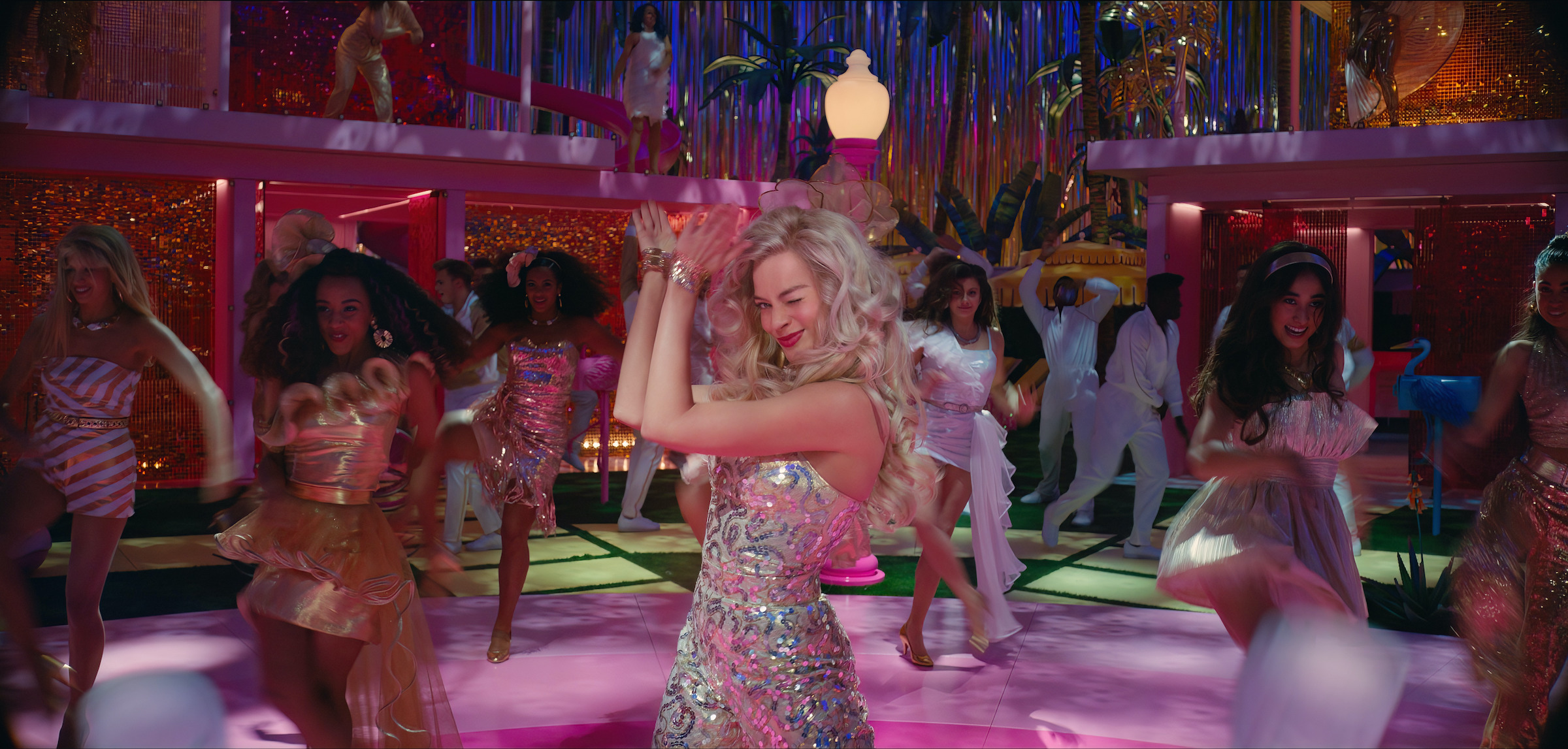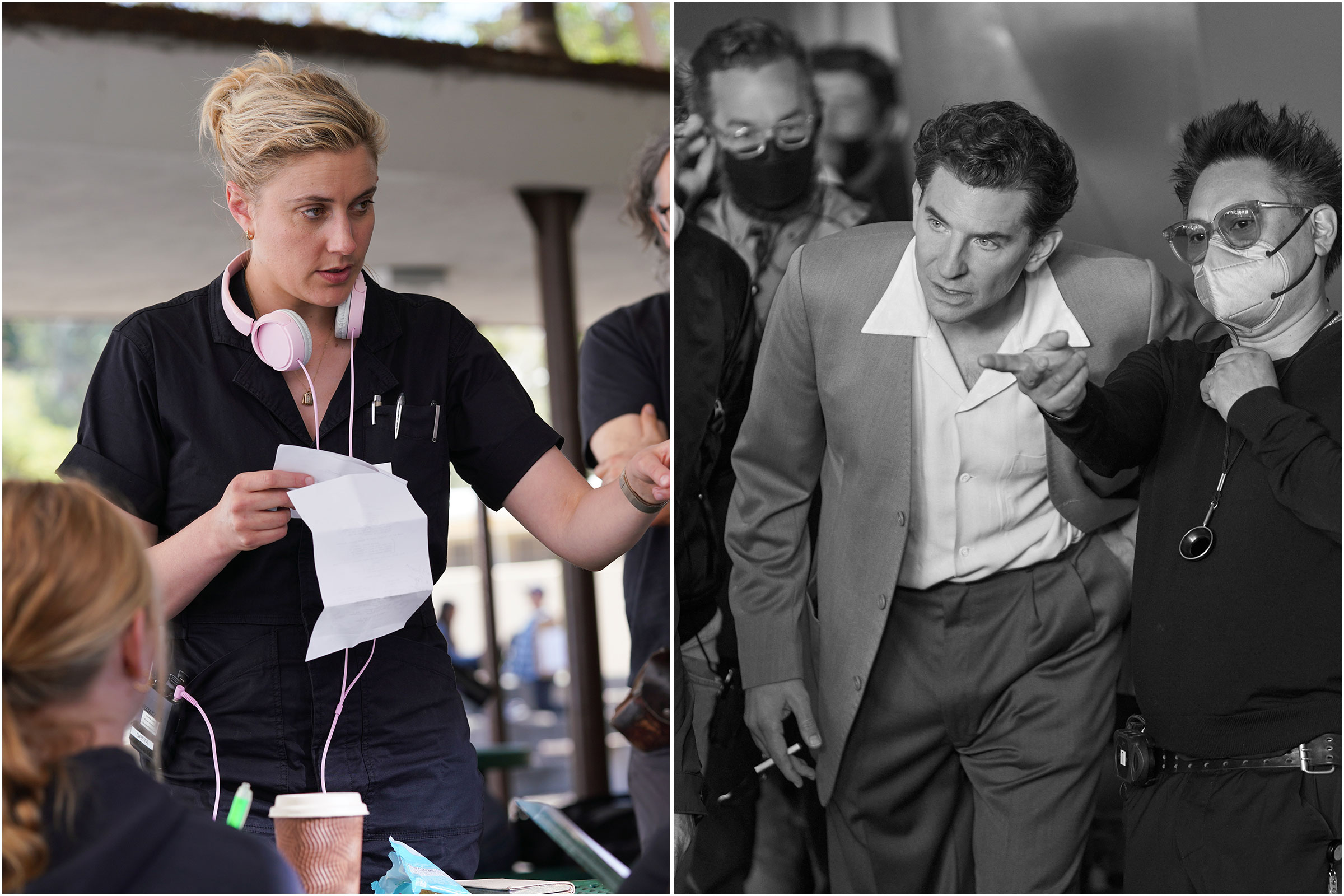Even in an age when you can shoot a movie on an iPhone, you need the heart of a lion to make a film and get it out there. To make all the necessary decisions, to get the gears going for every day of pre-production, shooting, and post-production, to answer each of the million and one questions that come up on a film set, you need higher-than-normal confidence levels, and any self-doubts you have had better be worked out in private. This is as true in 2024 as it was in 1924, 1954, 1974, or any year in between. And it’s as true for a veteran director (like Martin Scorsese) as it is for a younger, less-well-known French filmmaker who got her start in documentaries (like Anatomy of a Fall director Justine Triet).
And still, in the world of filmmaking—as elsewhere—ambition is a dirty word, especially if you’re a woman. When the Oscar nominations were announced on Jan. 23, it wasn’t particularly surprising that both Barbie and Maestro received Best Picture nods. But the people most clearly responsible for bringing those pictures to the screen, Greta Gerwig and Bradley Cooper, were absent from the Best Director category. Barbie and Maestro are two wildly different pictures, and there are night-and-day distinctions between the sensibilities of the directors who made them: Gerwig is sunshine; Cooper is moonlight. The Academy is, of course, a voting body and not a sentient individual. But this group—even after it became more diversified in the wake of the Oscars So White movement—still has its blind spots, especially when it comes to women and people of color. So it’s normal to wonder if there isn’t some collective disapproval shining through the scrim of these omissions. Are both Gerwig and Cooper guilty of wanting too much too soon?
Read more: The Internet Has a Surprising Theory About Greta Gerwig’s Barbie Oscars Snub
One of the problems, of the Academy’s own making, is that there are 10 Best Picture slots and only 5 for Best Director. (The change was made in 2009 to widen the playing field and to provide more chances for films in less frequently recognized genres, like animation and comedy, to win.) So in any year, it’s likely there will be four or five movies that seemingly directed themselves; singling those filmmakers out as being snubbed doesn’t take much imagination. But for whatever reason, the other non-nominated directors whose films made the Best Picture cut this year (Celine Song for Past Lives, Alexander Payne for The Holdovers, and Cord Jefferson for American Fiction) don’t have the same hot-button quality that Gerwig and Cooper have. Though they’ve of course done interviews, they haven’t been as widely exposed—or perhaps overexposed—as Gerwig and Cooper have. These two face another liability: both are actors as well as directors, which means the public automatically has a deeper relationship with them—and actor-directors always have to work harder to prove their worth as filmmakers, too. Unwittingly, Gerwig and Cooper may have ended up like the kids in class who sit up front and beg, “Pick me, pick me!” The teacher, almost reflexively, looks right past them. Maybe you would, too.
But for better or worse, Cooper and Gerwig are in a class by themselves this year. Gerwig defied expectations by making what was seen by many as a smart, feminist movie about a semi-controversial toy; she also delivered a huge box-office hit, and the fact that a woman could actually do so hit Hollywood like a lightning bolt. (My onetime mother-in-law, a New Englander by marriage, used to have an expression that summed up this type of duh! moment: “The light dawns on Marblehead.”) And although the idea for Maestro didn’t originate with Cooper, he jumped into the project with Leonard Bernstein-like gusto; he studied conducting for six years in preparation. He took a chance by wearing a prosthetic nose for his role, which incited controversy early on—and however you ended up feeling about that nose, once you saw it in that first released image, you couldn’t unsee it. As their films rolled out, the one thing Gerwig and Cooper had in common was that you couldn’t ignore them.

Maybe that turned out to be a liability. The Barbenheimer phenomenon turned Barbie into a force of nature; it was great for the industry, but somewhat exhausting in the runup. By the time Barbie was released, I’d become worn down by all the interviews given by Gerwig and her star (and one of the movie’s producers) Margot Robbie, as well as other members of the cast. And that's not to mention the Mattel overlords who’d funded the film, and who professed they were at first shocked by Gerwig’s intentions for the movie, only to end up touting how evolved they were in letting her have her way after all. Before Barbie had even opened, I'd grown weary of hearing how smart this movie about a doll was going to be. (I've been pro-Barbie all my life, so I didn’t need convincing there.) Then I saw it, and my suspicions were confirmed: though I loved Robbie’s performance, and Ryan Gosling's Ken, as well as the production and costume design, Barbie’s relentless “This movie is feminist! Really!” sloganeering wore me down.
But even if Gerwig’s vision didn’t resonate with me, I would concede in a heartbeat that she had used her intelligence and instincts to reach for something seemingly impossible. She took a big swing with Barbie, and whether you like the film or not, you can see her fingerprints all over it. The Academy did grant the film eight nominations in total, not exactly shabby for big commercial blockbuster. And Gerwig and her co-writer and husband, Noah Baumbach, did receive a nomination for Adapted Screenplay—but that makes the Director omission even more glaring. As a filmmaker and a presence, Gerwig has big Theater Kid energy. And because she’s already made several acclaimed movies, she can’t be anyone’s discovery. But it still seems strange that the Academy had the chance to recognize a woman director who's made a much-loved movie that has also broken box-office records, and failed to do so. (In addition to being the highest-grossing movie of 2023, Barbie is the highest-grossing film ever made by a woman.) Critics, moviegoers, and the Academy often want to celebrate different things for different reasons. We often wrongly laud the Academy as being a group of people with good taste, when really it’s a body designed to make Hollywood feel good about itself. In that context, its failure to recognize Gerwig is even weirder.
And what about Cooper, who, like Gerwig, has been working in the industry for years, and who also has a number of Oscar nominations (as actor, producer, and director) to his credit? Maestro has been recognized in seven categories, including Best Picture. Cooper is a producer of the film; he has also been nominated for his performance and for the movie’s screenplay, which he co-wrote with Josh Singer. Although Maestro premiered during the SAG strike, Cooper quickly made up for lost time in promoting the film. He has been forthright and earnest about his approach to bringing the story of Bernstein—and, more specifically, his marriage to the Chilean-Costa Rican actor Felicia Montealegre, played by Carey Mulligan—to the screen. I happen to love Maestro. While others shrink from its bravado, I adore the way Cooper fills the screen with big-feeling vibrations. Even so, he’s sensitive to the unorthodox nuances of this relationship: here’s a story about two vibrant individuals who, in the 1950s, were working their way through complex expectations of what a marriage should and could be—as well as making a distinction between spiritual loyalty and sexual fidelity. That seems pretty progressive to me—the opposite of awards bait, actually—and you’d think it would be a plus for all those people who complain about what they see as tired biopic clichés.

Even so, in the past few months, I’ve encountered roughly equal numbers of people who love Maestro and people who despise it, with almost nothing in between—and those who hate it are particularly noisy online. I’ve heard people mock Mulligan-as-Felicia’s slow-death-from-cancer scenes. (“Just die, already!”) Some of these takes are gently mischievous, some are just plain bad, and some come from cloudy notions of what we expect—or want—a biopic to be. Because I’m unshakable in my love for Maestro, I find it fascinating to hear why others hate it, and at this point I’ve heard everything: It’s too gay. It’s too straight. It’s too much about the marriage—who cares?—and not enough about Bernstein’s career. It doesn’t respect Bernstein enough. It lets Bernstein get away with too much. There aren’t enough scenes of actual conducting. Cooper, in his prosthetic nose, is too cartoony, too overbearing, just bad. Mulligan’s Felicia steals the show from him.
But no one has accused Maestro of being too small, and if you think its grandness is a flaw, there's only Cooper to blame. I think Cooper is a big part of why some moviegoers and critics—and, at least to a degree, the Academy—dislike Maestro. A colleague of mine put it this way: The Academy should have just given him something for A Star Is Born to get him out of the way for a while. Now, it’s almost as if they want to curb his impulses, to show him that he’s not as big a deal as he thinks he is. It’s possible they’ve been influenced by the online Maestro haters, who seem to think Cooper is way too thirsty for an Oscar. The campaigning season is a horror show for lots of reasons, not least because people who just really want to make movies are thrust into the position of promoting them—and may even end up overpromoting them. That can naturally affect how we feel—or the Academy feels—about a movie.
Then again, if you don’t speak up for a movie you’ve poured years of your life into, who will? The line between being overambitious and just getting the word out is easily blurred. We’d also be justified in asking, "Who cares about an ambitious white guy?" And it’s true: in a field, like most fields, where white men have had more than their share of opportunity, we need more ambitious filmmakers of all kinds. The movie world has a long history of actor-directors—Orson Welles, Clint Eastwood, Warren Beatty, George Clooney, the list goes on—who have strived to have it all. We need smart, driven people, and they can’t all just be white men. Just ask Ava DuVernay, Gina Prince-Bythewood, and Dee Rees—filmmakers who have made terrific, underrecognized pictures in the past dozen years—what it takes to send a movie out into the world.
But deciding who should be praised for ambition and who should be punished only leads to a restrictive way of looking at art. We can sneer at the idea of a director’s vision, especially if it’s a director we don’t particularly like. But when a movie finally sees the light of day, it’s the director who’s holding the bag; its merits or failures fall on his or her head. We should want filmmakers to think big, even if that means they have further to fall. Because when they hit it right, the rewards are great for us too.
More Must-Reads from TIME
- Cybersecurity Experts Are Sounding the Alarm on DOGE
- Meet the 2025 Women of the Year
- The Harsh Truth About Disability Inclusion
- Why Do More Young Adults Have Cancer?
- Colman Domingo Leads With Radical Love
- How to Get Better at Doing Things Alone
- Michelle Zauner Stares Down the Darkness
Contact us at letters@time.com
